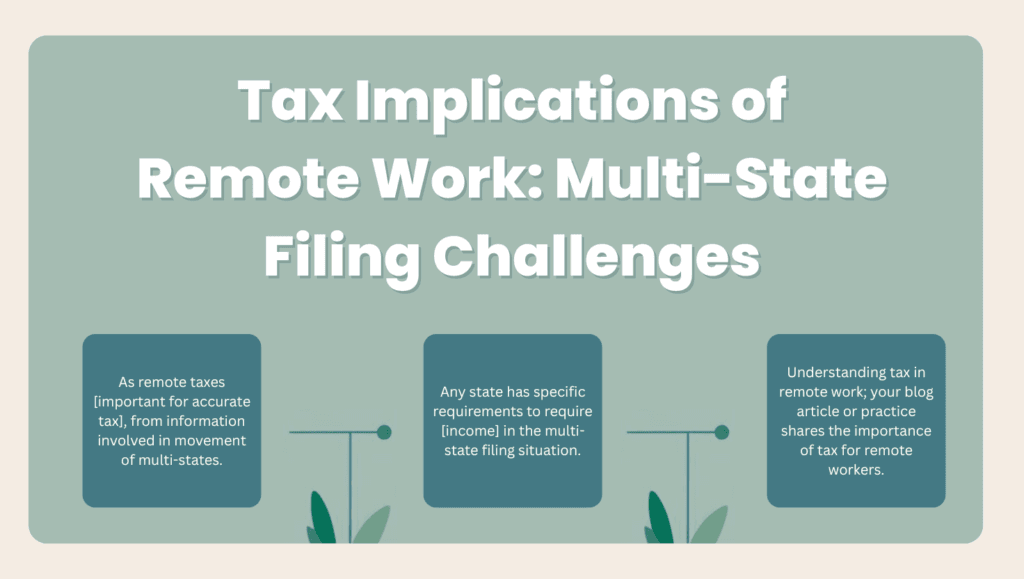
We Make Tax Filing A Breeze
Home » The Rise of Remote Work: Understanding US Multi-State Tax Filing Challenges

The shift towards remote work has offered unprecedented flexibility for employees and employers alike. However, this flexibility introduces significant complexities when it comes to US state income taxes. If you work remotely, especially if you live in one state and work for a company based in another, or if you move between states while working, understanding your state tax obligations is crucial. Failing to comply can lead to penalties and interest.
This post will guide you through the common challenges and key concepts surrounding multi-state tax filing for remote workers in the United States.
Unlike federal income tax, which applies nationwide, state income tax rules vary significantly from state to state. Some states have no income tax, while others have complex regulations. Remote work complicates things primarily due to two core concepts: nexus and residency.
Nexus refers to the connection or link between a taxpayer (an individual or a business) and a state that gives the state the right to tax the taxpayer’s income. For individuals, simply performing work physically within a state, even temporarily, can create tax nexus. This means you might owe income tax to the state where you are physically located while working, even if your employer is based elsewhere and you are not a resident of that state.
States generally tax their residents on all their income, regardless of where it is earned. They also typically tax non-residents on income earned from sources within that state. When you work remotely for an employer in State A while living in State B, you are usually considered a resident of State B and potentially a non-resident earning income in State A, depending on State A’s specific rules (like “convenience of the employer” rules).
Several factors influence where you owe state income tax when working remotely:
The most fundamental principle is physical presence. The state(s) where you are physically located while performing work generally have the primary right to tax the income earned during that time. Even working for a single day in some states can trigger a tax liability.
Many states have specific thresholds – often a certain number of days worked within the state or a certain amount of income earned there – before a non-resident is required to file a state tax return. These thresholds vary widely.
Understanding the distinction is critical, as you could potentially be considered a resident by more than one state under different rules.
The most significant risk is being taxed on the same income by multiple states. While mechanisms exist to mitigate this (see Credits below), navigating the rules to avoid it can be complex.
Employers are generally required to withhold state income tax for the state where the work is performed. For remote employees, determining the correct state(s) for withholding can be challenging, especially if the employee moves or works temporarily in different locations. Incorrect withholding can lead to unexpected tax bills or large refunds for the employee.
Accurately tracking the days worked in each state is essential for both employees (to file correctly) and employers (to withhold correctly). This requires diligent record-keeping.
Each state has its own definitions, thresholds, and rules regarding remote work income, residency, and nexus. Some states have reciprocal agreements (meaning they won’t tax residents of the other state), while others have specific “convenience of the employer” rules that can impact taxation if you work remotely for an out-of-state employer for your own convenience rather than the employer’s necessity.
If your remote work situation creates tax obligations in multiple states, you’ll likely need to file multiple state tax returns:
You will typically file a resident tax return in your state of domicile (and potentially any state where you meet statutory residency requirements), reporting all your income, regardless of where it was earned.
You may also need to file non-resident tax returns in other states where you physically worked and earned income above that state’s filing threshold. On these returns, you generally only report the income earned specifically within that state.
To prevent double taxation, your resident state will usually offer a tax credit for income taxes you were legally required to pay to other (non-resident) states on the same income. However, the credit is often limited to the amount of tax your home state would have charged on that income. Calculating and claiming these credits correctly requires careful attention.
Businesses employing remote workers across different states face their own set of compliance hurdles:
Having employees working remotely in a state can create nexus for the employer in that state. This may obligate the business to register in that state and potentially pay state corporate income taxes, franchise taxes, and sales taxes, even if the company has no physical office there.
Employers generally must register with each state’s tax agency where their remote employees work. They are responsible for withholding the correct amount of state (and sometimes local) income tax based on where the employee is performing services and remitting it to the appropriate authorities. This includes complying with state-specific unemployment insurance requirements.
Multi-state taxation for remote workers is one of the most complex areas of US tax compliance, heavily dependent on the specific facts and the interaction of different state laws. Both individuals and businesses often find these rules challenging to navigate.
Given the intricacies and potential pitfalls, seeking professional guidance is often advisable. Ensuring compliance from the outset can prevent significant headaches, penalties, and interest down the road. TheTaxBooks regularly assists individuals and businesses in navigating complex US tax situations, including multi-state filing requirements and employer payroll obligations.
This blog post is for informational purposes only and does not constitute professional tax advice. Tax laws are complex and subject to change. Consult with a qualified professional, such as an Enrolled Agent or CPA, for advice specific to your unique situation.
To learn more about how you can reduce your taxes and save money, check out the helpful resources on our blog or contact us today to schedule a consultation.